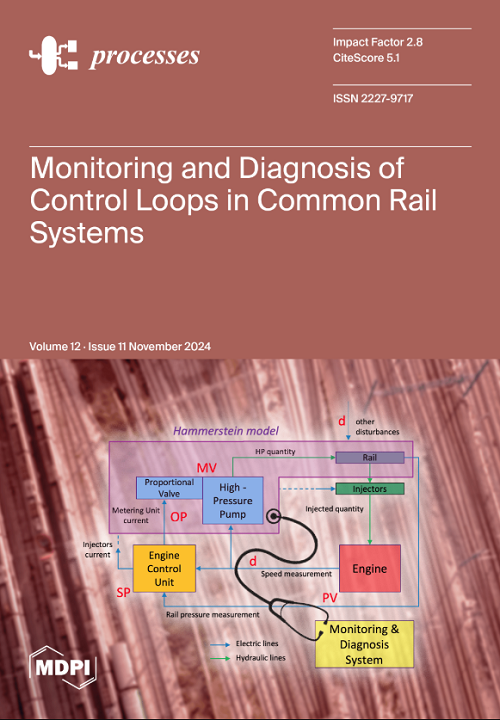质子交换膜燃料电池中的关键部件降解:通过加速耐久性测试揭示机理
IF 2.8
4区 工程技术
Q2 ENGINEERING, CHEMICAL
引用次数: 0
摘要
在推动质子交换膜燃料电池商业化的过程中,燃料电池的长期耐久性已成为一个关键的考虑因素。虽然现有的耐久性测试对评估电池性能至关重要,但这些测试往往耗时较长,而且不能快速反映实际运行条件对电池的影响。本研究利用改进的测试协议来解决这一问题,旨在缩短测试周期,更有效地评估实际运行条件下电池性能的退化情况。通过两种测试方案--基于开路电压(OCV)的加速耐久性测试(ADT)和基于相对湿度(RH)循环的加速耐久性测试(ADT)--进行了加速耐久性分析,以评估 MEA 的使用寿命和性能衰减过程。基于开路电压的 ADT 表明,降解是机械和化学过程的综合结果。基于相对湿度循环的 ADT 表明降解主要来自机械过程。我们采用原位氟释放率技术来阐明质子交换膜在 ADT 过程中的降解情况。结果发现,质子交换膜在基于 OCV 的 ADT 条件下受到的破坏更为严重。耐久性测试后的 F- 损失量高达 3.50 × 10-4 mol/L,是基于相对湿度循环的 ADT 的 4.3 倍。此外,基于相对湿度循环的 ADT 对催化剂层有显著影响,在 ADT 结束时,电化学活性表面积减少了 48.6%。此外,透射电子显微镜观察到催化剂的团聚现象比基于 OCV 的 ADT 更为明显。值得注意的是,两种测试方案对气体扩散层均无明显影响,气体扩散层的接触角也无明显变化。这些发现有助于理解质子交换膜燃料电池在不同工作条件下的降解行为,也为制定更有效的测试方案提供了科学依据。本文章由计算机程序翻译,如有差异,请以英文原文为准。
Key Components Degradation in Proton Exchange Membrane Fuel Cells: Unraveling Mechanisms through Accelerated Durability Testing
In the process of promoting the commercialization of proton exchange membrane fuel cells, the long-term durability of the fuel cell has become a key consideration. While existing durability tests are critical for assessing cell performance, they are often time-consuming and do not quickly reflect the impact of actual operating conditions on the cell. In this study, improved testing protocols were utilized to solve this problem, which is designed to shorten the testing cycle and evaluate the degradation of the cell performance under real operating conditions more efficiently. Accelerated durability analysis for evaluating the MEA lifetime and performance decay process was carried out through two testing protocols—open circuit voltage (OCV)-based accelerated durability testing (ADT) and relative humidity (RH) cycling-based ADT. OCV-based ADT revealed that degradation owes to a combined mechanical and chemical process. RH cycling-based ADT shows that degradation comes from a mainly mechanical process. In situ fluoride release rate technology was employed to elucidate the degradation of the proton exchange membrane during the ADT. It was found that the proton exchange membrane suffered more serious damage under OCV-based ADT. The loss of F- after the durability test was up to 3.50 × 10−4 mol/L, which was 4.3 times that of the RH cycling-based ADT. In addition, the RH cycling-based ADT had a significant effect on the catalyst layer, and the electrochemically active surface area decreased by 48.6% at the end of the ADT. Moreover, it was observed that the agglomeration of the catalysts was more obvious than that of OCV-based ADT by transmission electron microscopy. It is worth noting that both testing protocols have no obvious influence on the gas diffusion layer, and the contact angle of gas diffusion layers does not change significantly. These findings contribute to understanding the degradation behavior of proton exchange membrane fuel cells under different working conditions, and also provide a scientific basis for developing more effective testing protocols.
求助全文
通过发布文献求助,成功后即可免费获取论文全文。
去求助
来源期刊

Processes
Chemical Engineering-Bioengineering
CiteScore
5.10
自引率
11.40%
发文量
2239
审稿时长
14.11 days
期刊介绍:
Processes (ISSN 2227-9717) provides an advanced forum for process related research in chemistry, biology and allied engineering fields. The journal publishes regular research papers, communications, letters, short notes and reviews. Our aim is to encourage researchers to publish their experimental, theoretical and computational results in as much detail as necessary. There is no restriction on paper length or number of figures and tables.
 求助内容:
求助内容: 应助结果提醒方式:
应助结果提醒方式:


